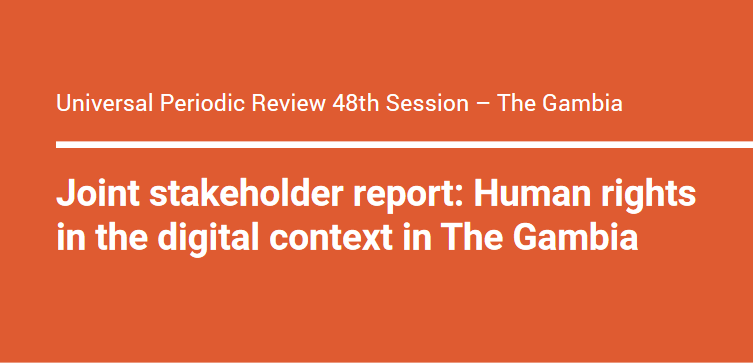Gambiaj.com – (BANJUL, The Gambia) – A recent joint stakeholder report sheds light on the complex landscape of digital rights in The Gambia, highlighting both significant advancements and ongoing challenges. The report, presented during the Universal Periodic Review’s 48th Session, underscores the strides made by the Gambian government in digital access and inclusion but also raises concerns regarding online freedom of expression, privacy, and cybersecurity.
The report recalls that over the past decade, The Gambia has prioritized digital inclusion, supported by initiatives such as the establishment of the Ministry of Communications and Digital Economy (MOCDE) in 2022. The ministry has implemented several policies, including the National Digital ID and Digital Transformation Strategy 2023-2028, aimed at expanding access and connectivity across the country. Despite these efforts, infrastructural challenges persist, as demonstrated by multiple internet outages between 2021 and 2022 and concerns about affordability and accessibility.
The report highlights that legal and regulatory issues remain central to the debate on digital rights. Disinformation is a complex issue requiring a comprehensive strategy for prevention and solutions. Remedy should avoid criminalization and be democratic, especially in policy and regulatory actions. States should consider legality, necessity, and proportionality when implementing measures, as restricting information disorders may negatively impact free speech and opinion.
The Gambia’s legal framework contains several outdated provisions that restrict freedom of speech, including sections of the Criminal Code that criminalize sedition and the publication of “false information.” Although parts of these provisions were declared unconstitutional by the Supreme Court, full legal reforms have been delayed.
The National Assembly is currently considering a draft Cybercrime Bill, introduced in March 2024, that does not adhere to international and regional human rights standards. Some of the provisions include making the possession of digital security tools illegal, criminalizing online expression, and granting police and surveillance powers.
It is necessary to repeal and reform the Cybercrime Bill in order to guarantee that all of its provisions respect global human rights norms pertaining to freedom of speech and expression. Sections that unnecessarily criminalize free expression should also be removed.
Privacy and data protection are also under scrutiny. Despite The Gambia’s ratification of the African Union Convention on Cyber Security and Personal Data Protection, the country lacks a comprehensive data protection law. The absence of a data protection authority, as required by the Malabo Convention, further weakens safeguards against unauthorized data access and misuse.
The report highlights the growing prevalence of technology-facilitated gender-based violence (TFGBV) in The Gambia, with 45.5% of female social media users reporting some form of online harassment. Despite this alarming statistic, there is limited awareness and inadequate legal mechanisms to address TFGBV, leaving many women without effective recourse.
Aspects of TFGBV should be covered by current legislation on gender-based violence, and legislative solutions should adhere to international human rights norms. As a practical, efficient, and significant means of supporting TFGBV victims and guaranteeing the administration of justice, redress and reparations ought to be offered.
The report urges the Gambian government to prioritize digital rights and freedom of expression while expanding digital access. Recommendations include repealing restrictive legal provisions, implementing a comprehensive data protection framework, and ensuring that new legislation aligns with international human rights standards.
Addressing gender-based violence and enhancing digital literacy, particularly in rural areas, are also emphasized as critical steps toward achieving inclusive digital development. Advocates of the report include The Association for Progressive Communications (APC) and Jokkolabs Banjul.
As The Gambia seeks to balance its digital ambitions with respect for human rights, stakeholders are calling for greater regulatory oversight, inclusive policy-making, and sustained investment in infrastructure to bridge the digital divide.










